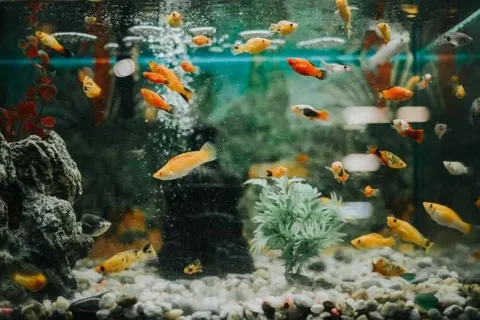Aquarium Water Treatment Market: Innovations in Chemical Solutions and Technology

The aquarium water treatment market is witnessing a dynamic transformation driven by advancements in chemical solutions and technology. As hobbyists and professionals alike seek more efficient, effective, and environmentally friendly methods to maintain healthy aquatic environments, innovations are emerging to meet these demands.
The Importance of Water Quality
Water quality is paramount in aquarium management. It affects not only the health and growth of aquatic life but also the overall aesthetic of the aquarium. Parameters such as pH, ammonia, nitrite, nitrate levels, and temperature need to be monitored and managed to create a balanced ecosystem. Poor water quality can lead to stress, disease, and even death among fish and plants.
Innovations in Chemical Solutions
- Biodegradable Chemicals
One of the most significant trends in the aquarium water treatment market is the development of biodegradable chemical solutions. Unlike traditional chemical treatments that can be harsh and leave harmful residues, biodegradable options are formulated using natural ingredients that break down safely in the aquatic environment.
These eco-friendly solutions not only help in managing water quality but also promote a healthier ecosystem by minimizing the risk of chemical buildup. Many manufacturers are now focusing on plant-based extracts, enzymes, and probiotics that provide effective treatments for common aquarium issues like algae growth and disease without compromising environmental integrity.
- Probiotic Treatments
Probiotics are gaining traction in the aquarium water treatment market as a means to enhance biological filtration. These beneficial bacteria can break down organic waste and reduce harmful substances, creating a balanced ecosystem. By introducing probiotics into the aquarium, aquarists can enhance the natural processes that maintain water quality.
These probiotic treatments can also help establish beneficial bacteria colonies in new aquariums, making them an excellent choice for new setups. The ability to maintain water quality through natural means is appealing to many hobbyists who are increasingly concerned about the ecological impacts of their practices.
- Targeted Chemical Solutions
Innovation in chemical formulations is also leading to more targeted treatments that address specific problems without affecting the overall balance of the aquarium. For example, specialized products are being developed to combat specific types of algae or pathogens, allowing for more precise interventions.
These targeted solutions are formulated to be effective at lower concentrations, reducing the risk of negative side effects on beneficial microorganisms. This approach not only enhances the efficacy of treatments but also aligns with the growing consumer demand for environmentally responsible options.
Technological Advancements
- Smart Monitoring Systems
In tandem with innovations in chemical solutions, technological advancements are reshaping the aquarium water treatment market. Smart monitoring systems are becoming increasingly popular, allowing aquarists to continuously track water quality parameters in real time. These systems use sensors to measure pH, ammonia, nitrite, nitrate levels, and temperature, providing instant feedback to users.
Connected to mobile applications, these smart systems can alert users to any fluctuations in water quality, enabling prompt action. This technology empowers aquarists to maintain optimal conditions for their aquatic life, reducing the risk of stress and disease.
- Automated Dosing Systems
Automated dosing systems represent another exciting technological advancement in the aquarium water treatment market. These systems can be programmed to dispense specific amounts of chemical treatments at set intervals, ensuring consistent dosing and reducing the risk of human error.
Automated systems are particularly beneficial for larger aquariums or aquaculture operations, where precise control over water parameters is critical. By automating the treatment process, aquarists can save time and ensure that their aquatic environments remain stable and healthy.
- Artificial Intelligence (AI) and Machine Learning
The integration of AI and machine learning into aquarium management represents the cutting edge of technological innovation. These systems can analyze data collected from smart monitoring devices to predict potential water quality issues before they arise.
For instance, AI can identify patterns in water quality fluctuations and provide recommendations on preventive measures. By leveraging advanced algorithms, aquarists can take proactive steps to maintain optimal conditions, enhancing the overall health of their aquatic ecosystems.
Consumer Trends and Market Impact
The convergence of innovative chemical solutions and advanced technology is being driven by changing consumer preferences. As aquarists become more knowledgeable and environmentally conscious, they are actively seeking products that promote sustainability without sacrificing effectiveness.
The aquarium water treatment market is also witnessing an increase in the availability of educational resources, allowing consumers to better understand the importance of water quality management. Manufacturers that provide transparent information about their products’ environmental impact, efficacy, and safety will likely capture the loyalty of increasingly discerning consumers.
Challenges and Future Directions
Despite the promising advancements, challenges remain in the aquarium water treatment market. The need for rigorous testing and validation of new products and technologies is paramount. Ensuring that innovative solutions meet safety and efficacy standards will be crucial for gaining consumer trust and regulatory approval.
- Art
- Causes
- Crafts
- Dance
- Drinks
- Film
- Fitness
- Food
- Games
- Gardening
- Health
- Home
- Literature
- Music
- Networking
- Other
- Party
- Religion
- Shopping
- Sports
- Theater
- Wellness


